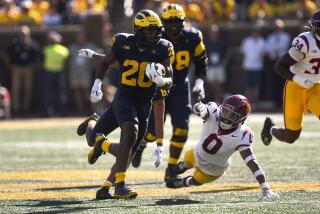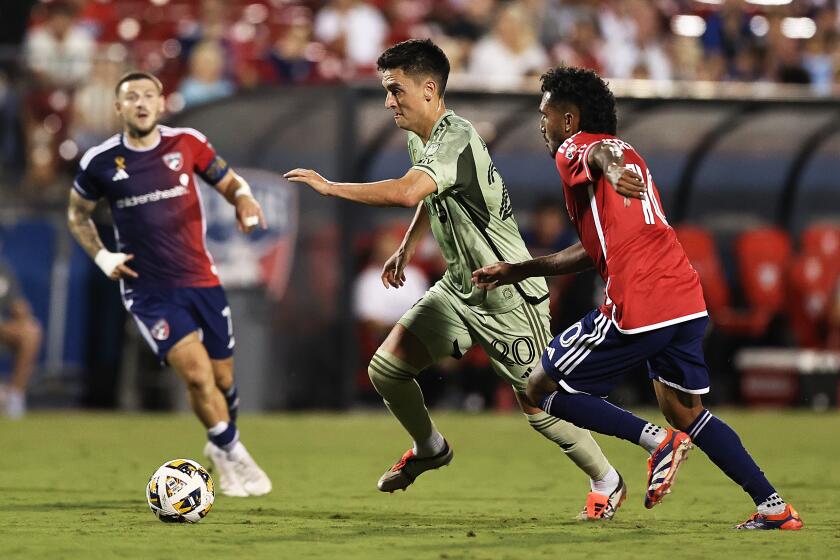BCS system seems geared to stay
It was a tough year politically for the controversial Bowl Championship Series, which had to go on the defensive after being called all sorts of nasty things in an ominously titled book: “Death to the BCS.”
Yet, despite criticism of the 13-year-old system that determines college football’s national championship, and calls for a 16-team playoff by some, the BCS is here today — and probably here to stay.
“I will stand here and tell you this system works,” BCS executive director Bill Hancock said Monday at a meeting of the Football Writers Assn. of America.
The BCS, at least for now, appears to have the full support of ESPN, finishing up its first year of a four-year contract. ESPN executive Burke Magnus, who also attended Monday’s FWAA meeting, said his company would not push for expansion.
“We tread lightly here,” Magnus said. “We’re not the stewards of the game. We’re not the ones who set the format. We don’t see that as our role in any way.”
Hancock and Magnus said minor tweaks to the system, such as a “plus-one” playoff, are possible. Hancock, though, said “there is no overwhelming support to do anything different.”
Hancock said the expansion to a 16-team format, as outlined in the “Death to the BCS” book, is virtually a non-starter in discussions. Last month, Big Ten Commissioner Jim Delany, who is staunchly opposed to any playoff, said college football would sooner go back to the old bowl system than to an NFL-type format.
Hancock confirmed that the “old system” is “in the spectrum” of possibilities. It appears, though, the BCS will continue into the foreseeable future.
Held in check
Oregon went into the BCS championship averaging 49 points and 537.5 yards a game.
But Auburn held the Ducks to 449 yards, 75 rushing.
LaMichael James, who was averaging a nation-leading 153 yards a game, was limited to 49 yards in 13 carries.
Auburn tackle Nick Fairley had three tackles for losses, including a sack.
Ducks quarterback Darron Thomas completed 27 of 40 passes for 363 yards and two touchdowns, with two interceptions.
Heisman hindrance
Auburn quarterback Cam Newton became the ninth Heisman Trophy winner to play in the BCS title game — and only the third to come out with a victory.
USC’s Matt Leinart was selected the game’s most outstanding player before passing for 332 yards and five touchdowns in a rout of Oklahoma in the 2004 title game. Last season, Alabama running back Mark Ingram was similarly honored before rushing for 116 yards and two touchdowns in a victory over Texas.
Heisman winners that came out on the losing end: Florida State quarterback Chris Weinke (2000 title game), Nebraska quarterback Eric Crouch (2001), Oklahoma quarterback Jason White (2003), USC tailback Reggie Bush (2005), Ohio State quarterback Troy Smith (2006) and Oklahoma quarterback Sam Bradford (2008).
Quick hits
The game marked the 50th matchup between the Nos. 1 and 2-ranked teams in college football, the first between teams from the Pacific 10 and Southeastern conferences.
More to Read
Go beyond the scoreboard
Get the latest on L.A.'s teams in the daily Sports Report newsletter.
You may occasionally receive promotional content from the Los Angeles Times.












